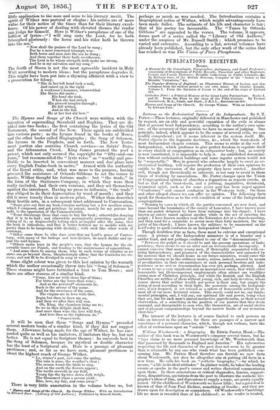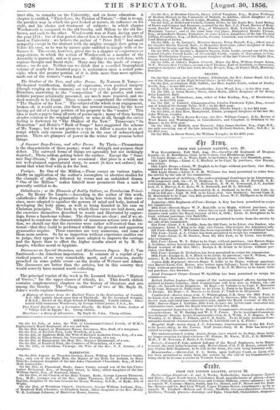PUBLICATIONS RECEIVED.
Boom.
A illanual for the Genealogist, Topographer, Antiquary, and Legal Professor; consisting of Descriptions of Public Records, Parochial and other Registers, County and Family Histories, Heraldic Collections in Public Libraries, &c. By Richard Sims, of the British Museum, Compiler of the " Index to the Heralds' Visitations," Sm.
The Popular History of ,gland : an Illustrated History of Society and Go- vernment from the earliest period to our own times. By Charles Knight. Volume I. From the Invasion of Ciesar to the end of the reign of Edward III.
Cathedra Petri : a Political History of the Great Latin Patriarchate. Books I. and II. From the First to the close of the Fifth Century. By Thomas Greenwood, MA., Camb. and Dinh.. F.ILS.L., Barrister-at-law.
Hymns and Songs of the Church. By George Wither. With an Introduction by Edward Farr.
Lectures on the Ecclesiastical System of the Independents. By S. T. Porter.—These lectures, originally delivered in Manchester and published by request, are an able and powerful exposition of the evils or abuses that at present beset Independency, according to the author's own opin- ion; of the accuracy of that opinion we have no means of judging. One principle, indeed, which appears to be the source of several evils, we can readily comprehend ; yet it seems inherent in the system itself. Mr, Porter objects to the dogmatic doctrines, &c., which the trust-deeds of most Independent chapels contain. This seems to strike at the root of Independency, which professes to give perfect freedom to regulate itself to every church or congregation as an independent body • but, as society is now constituted, it is impossible to help it. An established denomina- tion without ecclesiastical buildings and some regular system would not be "respectable." Men in general who subscribe largely to erect an ec- clesiastical building, will require the profession of their own opinions to entitle to the succession of the property they have erected. Another evil, though not theoretically so inherent, is not easy to avoid in these times of working by associations. Mr. Porter charges upon the "Union or Congregational system of churches a dogmatism as regards creeds, as bad as that of the trust-deeds, and a jobbing, inquisitive, dictatorial, tyrannical spirit, such as for some years past has been urged against ' Conference " and caused confusion in the Wesleyan body. On these and other alleged abuses we can offer no opinion. The following facts speak for themselves as to the evil condition of some of the Independent congregations. "Passing by eases in which all the parties concerned are now dead, and cases beyond the boundaries of the county of Lancaster, I have known more than one pastor debarred by force from entrance into his chapel; I have known an outcry raised against another while in the act of entering the pulpit ; I have known another read the Toleration Act at a church-meeting, and then send for a constable to arrest more than forty members, the ma- jority of his church ; I have known the military to be summoned on the Lard's-day to quell confusion in an Independent chapel."
Though doubtless true as facts, these must be extreme and exceptional cases. A picture of the Independent ministers is of a broader and a sadder kind, and not perhaps confined to one of the "denominations."
"Between the pulpit as it should be and the present operations of Inde- pendency, there seems to me an utter and an irreconcilable incongruity. I cannot conceive that many young men, if thoroughly acquainted with ex- isting Independency, and possessed of the characteristics and animated by the motives that we should desire in our future ministers, would enter the pastorate among us in the ordinary modes, unless, indeed, assured by means of peculiarities in their circumstances of such personal freedom and inde- pendence as no sect or denomination has ever yet, perhaps, allowed. And it seems to me a very significant and an inauspicious omen that while other honourable but ill-recompensed employments often. attract our wealthier young men of Christian pnriciple, and while the Romish and the English Churches are neither of them without young, rich, and holy devotees, whose course shows that neither wealth nor power is their aim, but simply the doing of good according to their light, the pastorate among the Ind - ents, if not despised, is yet refused as a sphere of honourable action by al- most all of our more favoured scions. This surely could not be, our funda- mental principles, and, I will say, our spirituel life and .power, being what they are, but for such men's almostinstinotive apprehension, or their actual observation, of a something in the position of our pastors that they cleem unsound, and disreputable to men who, like themselves, are of social circles and of pleasant companionships beyond the narrow limits of our sectarian churches."
The interest of the lectures is of course limited to such persons as take an interest in the subject; for there are passages of a narrow and sometimes of a personal character, which, though not verbose, have the effect of verboseness upon an "outside" reader.
William Wordsworth : a Biography. By Edwin Paxton Hood.—The author of this book was in Wordsworth's company several times but he "lays claim to no more personal knowledge of Mr. Wordsworth than that possessed by thousands in England and .America." His information respecting the life and character of the poet does not seem to be greater than is attainable by any one who reads what has been published con- cerning him. Mr. Paxton Hood therefore can furnish no new facts. about Wordsworth, nor does he altogether aim at putting old facts in a new form. He calls his book an " resthetic biography,"—by which he means' " a life in its ideal attitudes." In plainer words, he takes the leading events or epochs in the poet's career and writes rhetorical commentaries upon them. In these annotations or critical rhapsodies, fancies, supposi- tions, disquisitions, quotations from the poet to illustrate the resthetic bio- grapher's ideas of him, and digressions to supply a topic, are pretty equally mixed. Of the childhood of "Wordsworth we know little ; but a good deal is known of that of Jean Paul Richter, something of Goethe ; and they are drawn upon for description or comparison. Of Wordsworth's Cambridge life no more is recorded than of his childhood ; so the reader is treated,
inter all; to remarks on the University, and on home education. A chapter is entitled, "First-Love, the Passion of Nature,"—that is to say, the peculiar way in which the poet looked at nature, its influence on his style, and his choice and treatment of subjects : in which chapter Wordsworth is compared to the old Greeks, and Milton to the old He- brews, and each to the other. Wordsworth was at Paris during part of the year 1791; but of that period almost less is known than of his child- hood or University : we believe the author of "Peter Boll" had small sympathy except in the abstract with the mighty struggle then going on before his eyes, as he was by nature quite unfitted to mingle with or in- fluence it. The event, however, gives rise to a chapter of conjectures or suppositions, in which the notion of Wordsworth as a member of the Assembly is pursued ; and so it goes on. All this is very well done, with copious thought and fluent style. Many may like the mode of compo- sition; we do not. Neither can we think that a so-called biographical volume of nearly five hundred pages is undertaken upon a sound prin- ciple, when the greater portion of it is little more than mere opinion, made out of the writer's "own head."
The Shadow of the Yew, and other Poems. By Norman B. Yonge.— Mechanical versification, facility of expression, even poetical imagery (though verging on the common) are not very rare in the present time. Structure, answering to the " composition " of the painter, and some definite purpose artistically presented, are much more required, and in- deed scarcely to be found. These remarks comprehend the criticism on "The Shadow of the Yew." The subject of the whole is an engagement, broken off, it would seem, (for there are several versions,) by the lover having got rid of a large portion of his property to the "usurer." This idea is made a peg to hang all sorts of poems upon ; many of them having slender relation to the original subject, or none at all, though the entire feeling is darkened by "The Shadow of the Yew." Tennyson's "In Memoriam" and Heine's "Book of Songs" have suggested the scheme of Mr. Yonge ; but it is not given to a tyro to follow a master in an at- tempt which only success justifies even in the case of acknowledged genius. There are glimpses of power in the writer that promise better things.
A Summer Day-Dream, and other Poems. By Theta.—Pleasantness is the characteristic of these poems; want of strength and purpose their defect. The outward forms of things are agreeably but not strikingly depicted ; Theta seldom getting below the surface. Except the "Sum- mer Day-Dream," the poems are occasional : that piece is a wild and not well-planned supernatural story, to assert (it does not enforce) the moral that what God wills is for the best.
Vestigia. By One of the Million.—Prose essays on various topics, chiefly an application of the author's incomplete or abortive studies for the example of others, followed by verses and an unfinished drama. "One of the Million" makes himself more prominent than a unit is generally entitled to do.
Calisthenics ; or the Elements of Bodily Culture, on Pestalozzian Princi- ples. By Henry Be Laspee.—According to the author of this work, calisthenics differ from gymnastics in being less violent in their exer- cises, more adapted to equalize the powers of mind and body, instead of developing the body alone, as well as being founded in his case on Christian principles. The book in which these views are laid down, and the exercises themselves described in words and illustrated by engrav- ings, forms a handsome volume. The directions are clear; and if we at- tempted to condense the characteristic of numerous actions into a defini- tion, we should say that the exercises were rather self-centred than ex- ternal—that they could be performed without the grounds and apparatus gymnastics require. These exercises are very numerous, and some of them seem useless. So far as inspection without experience enables one to judge, they appear to be much more adapted to improve the carriage and the figure than to effect the higher results aimed at by M. De Laspee, whether moral or hygienic.
Discourses on Special Occasions, and Miscellaneous Papers. By C. Van Santvoord.—An American importation. It consists of a reprint of pe- riodical papers, of no very remarkable merit, and of sermons, mostly preached on some public event—as the deaths of Webster and Adams. The discourses are better than the articles, but in this country they would scarcely have seemed worth collecting.
The principal reprint of the week is Dr. Leonard Schmitz's "History of Greece," for the upper classes of schools, &c. This fourth edition contains supplementa7 chapters on the history of literature and arts among the Greeks. The "cheap editions" of two of Mr. Bayle St. dohn's works explain themselves.
A History of Greece from the Earliest Times to the Destruction of Corinth, B. C. 146; mainly based upon that of Thirlwall. By Dr. Leonhard Schmitz, F.R.S.E., Rector of the High School of Edinburgh. Fourth edition. Illus- trated with numerous Wood-cuts, by George Scharf junior, F.S.A., 8r.e.
Two Years' Residence in a Levantine Family. By Bayle St. John, Author of "Village Life in Egypt," &c. Cheap edition.
Maretimo : a Story of Adventure. By Bayle St. John. Cheap edition.



























 Previous page
Previous page